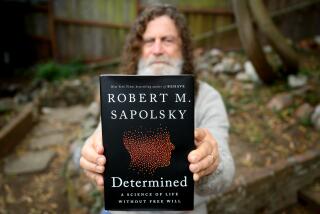Op-Ed: There’s nothing inherent about the fact that men outnumber women in the sciences

The saying “You can’t fight City Hall” captures the immovable nature of government bureaucracy. A recent barrage of supposedly expert opinion would have you believe that when it comes to gender inequality, City Hall is nothing compared with our own biology: Women and men, it’s said, are powerless against innate sex differences.
A paper in the journal Psychological Science compared 67 countries and found a paradox: The more gender-equal the society, the fewer the number of women seeking careers in STEM fields — science, technology, engineering and mathematics. Instead, women in the most egalitarian parts of the world are gravitating toward the humanities, making use of verbal rather than math skills.
Biology shouldn’t be fingered to justify inequality.
The paper’s authors are measured in their interpretation of these results, but plenty of commentators have jumped to a simplistic conclusion: Even when we provide girls with every chance to take on scientific work, they do not, and the difference between the sexes is due to “inherent preferences.” A similar argument was made by the writer of the now-infamous Silicon Valley memo “Google’s Ideological Echo Chamber”: Diversity training and equal opportunity be damned, you won’t make girls who likes pink and princesses into tech geeks who stay up all night writing computer programs in the basement.
All the talk about inherency is really just code for “the status quo isn’t going to change” — you can’t fight genes, hormones or our evolutionary City Hall. Expecting women to equal men in STEM careers is futile, and what can be done, because, well, biology.
Without a doubt, men and women are biologically different, but biology alone can’t account for complex gender differences, including the kind that might lead one to prefer words over numbers. Biology shouldn’t be fingered to justify inequality.
Consider the definition of “inherent preference.” The concept is a slippery one. It involves behavior and psychology; it’s not like leg length or eye color. And as it turns out, even those seemingly straightforward physical traits can be hard to characterize. Do you measure a leg before or after a person has spent a lifetime standing as opposed to sitting? What about the leg length of someone whose diet was deficient during childhood?
This kind of complexity is why saying that a trait or a preference — whether physical or psychological — is “inherent” (or “innate,” or “genetic,” or due to “nature not nurture”) is inaccurate. Genes are inherent, and they underlie behavior, psychology and leg length, all of which are also influenced by environment.
Take the example of human language. Most people understand that speaking French is learned. But of course you can’t teach your dog to say oui. Language and human speech have a genetic basis, or we would all be Dr. Dolittles. At the same time, speaking French is not embedded in anyone’s genome, although chauvinistic Francophones might deny it. We acquire French rather than English, Dutch, Urdu or some other language. It’s that difference in language, not speaking itself, that can be said to be learned.
If you wanted to test this, you could take identical twins, who have the same genetic makeup, and raise one in Paris and one in Amsterdam. If they each speak the language they are surrounded by, the language was learned, not innate. And if genetically dissimilar individuals are raised in the same household and they emerge speaking different languages, it could be said that speaking one tongue rather than another was genetic.
In the case of girls and science, we can’t possibly call a preference inherent unless we do the experiment: raising individuals of both sexes under the exact same circumstances and then determining they each want completely different things. You may think this could happen in families with boys and girls. But anyone who believes that brothers and sisters are raised exactly alike is deluded; study after study shows that varied expectations are imposed on males and females from the get-go. (This doesn’t rule out the possibility that boys and girls have different preferences; it just means we can’t do the appropriate test.)
Another problem with an emphasis on inherency is the way it provokes pseudo-evolutionary rationales. Humans evolved in hunter-gatherer societies, so some may posit that women are inherently interested in shopping because it mimics gathering berries and men inherently like sports because the competition mimics the hunt. These are post-hoc explanations, made after we’ve already observed a sex difference; they represent circular reasoning. What appears to be the inevitable result of genetic history isn’t. Our evolutionary story is more complicated than that.
We forget that specious biological absolutes have been common throughout history. A century ago it was claimed that women shouldn’t be educated because their reproductive abilities would be harmed by intellectual effort. Blaming genes and inherent preferences for the paucity of women in the sciences deserves the same scorn you’d heap on such a suggestion today.
If we believe gender-based preferences are the main creators of career patterns and success in egalitarian societies, we should see women, not men, at the top of most humanities fields. Girls have scored higher than boys on verbal skills, and apparently have preferred jobs that match those skills, for many decades. And yet, we are not straining to explain the male domination of Washington (78 out of 100 senators; 351 out of 435 representatives), nor do we assume that Shakespeare and Chaucer must have been women because no one who was that much an outlier in literary flair could possibly be male. Philosophy, which clearly requires verbal skills, is the physics of the humanities in its gender ratio (20% female, in academia). But, as Tania Lombrozo, the head of UC Berkeley’s Concepts and Cognition Lab, puts it, “the most plausible hypothesis” for the deficit is “implicit and explicit bias.”
Finally, a more personal note. I was a highly verbal, argumentative child, qualities my parents recognized with a Yiddish saying about being able to talk a dead horse back to life. It was an eye-rolling observation, not a compliment, but they recognized what they saw as a skill. I became a scientist anyway.
Marlene Zuk, an evolutionary biologist and behavioral ecologist, is a professor at the University of Minnesota. Her latest book is “Paleofantasy: What Evolution Really Tells Us about Sex, Diet and How We Live.”
Follow the Opinion section on Twitter @latimesopinionand Facebook
More to Read
A cure for the common opinion
Get thought-provoking perspectives with our weekly newsletter.
You may occasionally receive promotional content from the Los Angeles Times.










